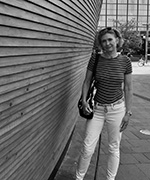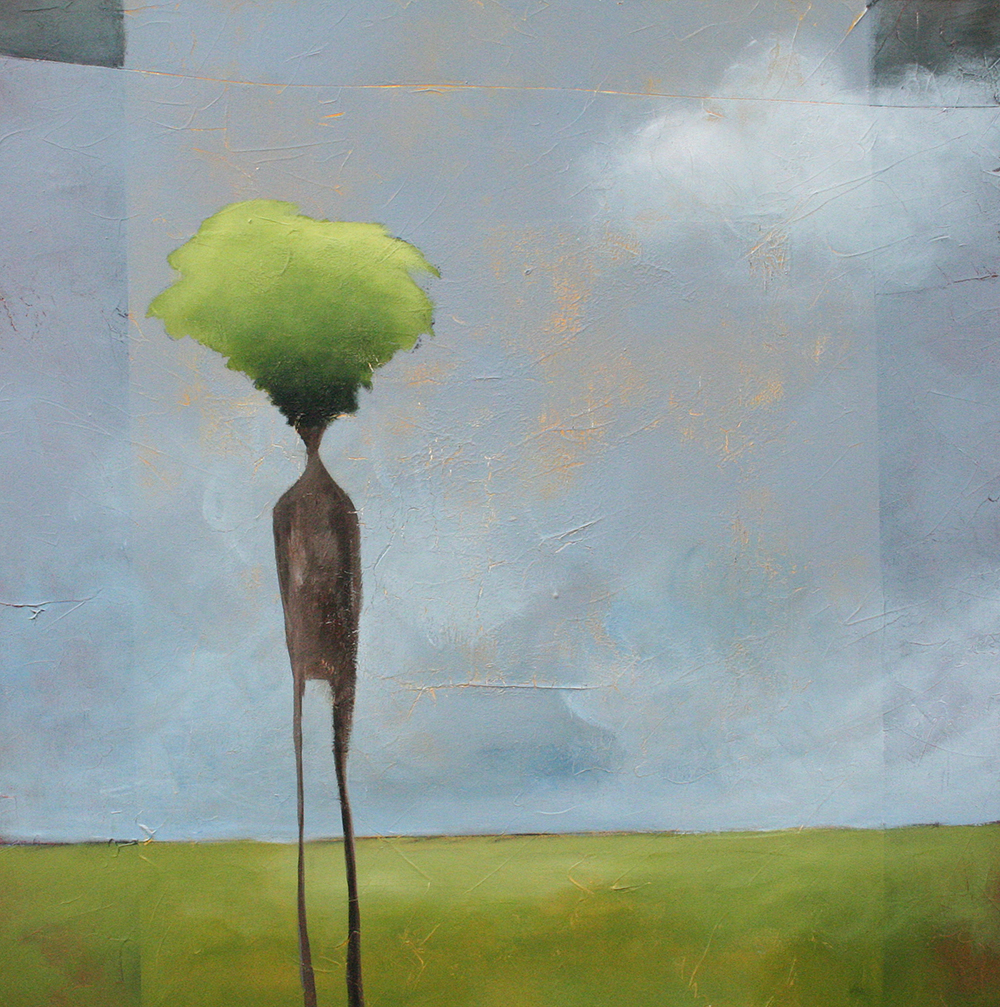By Tanya Perkins
Clear nights, her father would get out his telescope to show Cie the cosmos. Space was where everything started, he said. Light, heat, minerals, soil. Life grew from the carcasses of stars, incubators of carbon, the shapeshifter element preceding organelles of green.
Love is a place, he would say, holding with brightness of peace all places. A famous poet said those lines. Couldn’t remember the name. (She would learn, later—cummings, the poet who abjured capital letters). She said this to the chrysanthemum seller on the corner, to the barista who wrote her name like this—Sigh—to the probate attorney, to her mother, who preferred her own place. Cie inherited a wreck of a house on the outer rings of Indiana, where her great grandparents had lived until moving to Nova Scotia, cod instead of corn, the desire for water pushing against the hand. Forgotten, the house peeled through decades until someone had reminded her father, years ago, who told Cie that she was the only one to whom it would matter. After his funeral, she loaded up and followed the torn map, the little two-lane road through cornstalks and soybeans, the long grass waving her in.
And the pretty square urn in the trunk of her Corolla, an inheritance of ash, as in what used to be. At night, the empty fields backdropped Cassiopeia, Orion, the Dippers. She knows they might’ve blinked out ages ago, that constellations were an optical illusion, a matter of perspective, like everything else about her father. Mother and sister, silent, as when a stigma swells shut. Cie herself the one who stood apart, who had taken her father’s side when, resisting a rootbound life, he wandered. And later, when the cancer arrowed him to bed. What he’d wanted more than anything was to go back to this place, the root of everything, the place that held all places for him. As a boy, he’d visited Indiana. Just for a little while, but it counted. He’d told her how field crickets haunted night’s crevices, described shivery green fortresses of corn. On the ancient boards, a scythe like a pterodactyl bone. Don’t touch, his grandfather had said. The father, he’d begged to stay and stay. Root himself, dig in, hunker down in the invasive way of swinecress, paleseed, toadflax.
Bring him back, Cie’s mother texted.
Cie walks through the wreckage of a house and out back, to the fields clotted with ragweed and spurge. Already she is nestling a place, an idea, a seed which is first a feeling and then a name. It forms–Green Abandon, her new business. Green for the heirloom vegetables she’d sell, Abandon for everything else. Cie uses her small cash to tackle the place, discovers a knack for uprooting. Now she’s slapping paint, hoeing the field, laying patio brick for potted herbs, bacopa, coreopsis, roses, geranium, until she can make the fields produce what she wants. Callouses sprout first. She wears boots in the house to stay splinter-free, closes off the upstairs to save on electricity, sleeps on the living room floor, pours everything into the land. Hauls manure from a neighbor’s farm under the wheeling Dipper, mail-orders blood meal, turns compost by hand, dreaming of wax beans, plum tomatoes, rattail radishes, rainbow beets planted by the light of a fingernail moon.
She walks the perimeter of her land in the pale purple dusk, recites the day’s work to her father then makes tea in her Goodwill kettle, plugging it into her kitchen’s only working socket, balanced on a pallet of recovered brick. Outside, tender sprouts push up, like star-eyed infants.
Another text. Headstone is ready. They want him back, her mother and sister, not understanding how the taproot is already (fiercely) embedded and will not be dislodged. She can live with the parlor’s black mold and old paint winging up from every sill but not with betrayal.
We’re coming for him.
But she knows how to resist, as when a body seeks a cool spot, a place of reprieve within the loose soil. More importantly, she knows how to recycle. Her father’s lessons: the story of how space unfolded in sheets of hydrogen, helium, lithium, each falling away, petal-like. Rosettes of matter shed across a newly turned universe. No big bang but rather a big unfurling. Darkness, light, matter, cyanobacteria fluttering like ribbons. Interlocked chains, her father would say. Laid in dust, reborn in green.
So she retrieves the urn from the kitchen cupboard, where she’d kept it between the Folgers and the peanut butter, uses the little dented spoon from the cellar to divvy the gravelly ash into each pot. A tablespoon sprinkled over basil, bacopa, thyme, generous dollops over the ivy geranium, the hybrid tea rose named for a woman with double lashes, and the massive stubborn bird of paradise, lofting a tiny cloud, redolent of grey metal. The incarnation of memory. Cie bare-foots through the newly turned acre, trails the remainder across the loosened humus, a late summer sowing. The squared-off urn she pots with baby’s tears and set on the mantel, green beads dribbling down its glossy sides.
When mother and sister pull into the driveway, Cie gifts them crusted pots heavy with new growth, roots pulsing through the drain holes, hairline fractured from this newest unfurling.
He became equal, she tells them, between the new-turned acre and these pots, wherein new roots skillfully curl, as the poet would say.

Tanya Perkins’ work has appeared in numerous journals, including “Miracle Kids,” published in Tupelo Quarterly as a finalist for the TQ Open Prose Prize in November 2019, and “The American Mother,” published in South 85 Journal in the Summer of 2022. Her chapbook, People are Naturally Attracted to You, was published by WTAW Press in 2018, and her work “Agore é Sempre” won the Master Review Prize for Flash Fiction in 2021, judged by Stuart Dybeck. She also writes about creative writing pedagogy, with several publications in scholarly venues, and teaches creative and digital writing at IU East. Most recently she has been traveling in Scandinavia and has developed an addiction to knitting.

